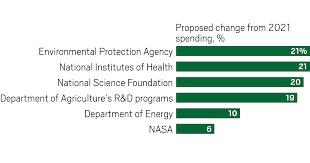The proposed budget presented by the President includes large increases for federal agencies involved in aspects of science and the environment. Generally Presidential budgets represent a wish list and are subject to political winds blowing in Congress. The proposed budget does however address priorities including health, the environment, competition with China, and job creation. Science represents the common theme through these areas of concern.

U.S. dominance in space, engineering, health and computer innovation are all attributed to advances in both basic and applied science. The U.S. has successively benefited from investments in the Land Grant University System post-civil war, from endowments to colleges, the influx of European refugee scientists in the 1930s and the broad advancement in science and technology as result of the post-WW II GI bill. The space race stimulated by advances made by Russia placed the U.S. at the forefront of both instrument and human exploration of the moon and the planets of our solar system. The achievements of science are clearly indicated by the volume of Nobel Prize awards to U.S. scientists, both immigrant and native born.
 More recently we have become aware of shortfalls in our responses to structural and societal challenges. The fact that the U.S. with 4.5 percent of the world’s population recorded close to 20 percent of the world’s confirmed fatalities due to COVID and in addition Mars currently has rovers landed by the U.S. and the People’s Republic of China both represent “Sputnik Moments”.
More recently we have become aware of shortfalls in our responses to structural and societal challenges. The fact that the U.S. with 4.5 percent of the world’s population recorded close to 20 percent of the world’s confirmed fatalities due to COVID and in addition Mars currently has rovers landed by the U.S. and the People’s Republic of China both represent “Sputnik Moments”.
U.S. peeminence in agricultural production is attributed not only to the efforts of farmers, but to the resources they have available. Science has created GMO cultivars, our research institutions and universities have developed vaccines to suppress livestock disease, have devised advanced methods of housing and nutrition to complement progress in genetic selection of livestock. Unless we continue to invest in both basic and applied science, we will inevitably fall behind our more progressive competitors.
The proposed budget for Fiscal 2022 includes the following budget increases for federal agencies involved in aspects of Science: -
- Environmental Protection Agency; 21 percent
- National Institutes of Health; 21 percent
- National Science Foundation; 20 percent
- Department of Agriculture R & D Programs; 19 percent
- Department of Energy; 10 percent
- NASA; 6 percent
It is noted that these increases are required to offset reductions in budget allocations in recent years. For example the Environmental Protection Agency was subjected to a 32 percent cut in 2021compared to the 21 percent increase suggested by the current Administration.
The proposed budget increases will allow for targeted restoration of programs constrained by previous policy. The proposal increases allocations to the National Institute of Standards and Technology allowing for two new manufacturing innovation institutes. Based on experience with COVID, Congress will be asked to fund an Advanced Research Project Agency for health within the National Institutes of Health that would deal with pandemic preparedness and would hopefully improve detection and response to any future outbreak. Advanced Research Project Agencies would be created for climate research within the Department of Energy and also the National Oceanic and Atmospheric Administration. Scientists in these agencies will play important roles in developing science-based programs to both monitor and generate policy to offset climate change.
To maintain our current preeminent position in agriculture and to enhance productivity necessary to feed a burgeoning population, we will require pivotal accomplishments such as the Norman Borlaug Green Revolution and the Manhattan Project. We can aspire to achieve the unattainable if we strengthen our scientific capability and adequately fund our scientific institutions and scientists. Hopefully with additional resources and appropriate coordination and management we will surpass the achievements of the previous generation.